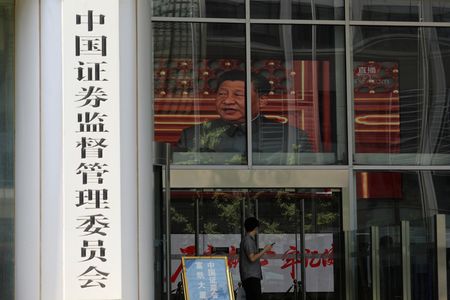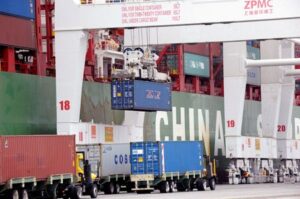By Selena Li
HONG KONG (Reuters) -China’s new offshore listing rules for domestic companies have left bankers and lawyers who work on listings unsure how to take on liabilities and avoid breaching tightened confidentiality rules, Asia’s largest financial lobby group said on Tuesday.
China’s long-awaited rules for offshore stock exchange listings came into effect on March 31 as part of a regulatory tightening on cross-border listings after years of a laissez-faire approach.
There is “a lot of nervousness” among the bankers, lawyers and accountants who are now required to formally pledge with China’s securities regulator within three days of an overseas listing that they guarantee “truthfulness, accuracy, completeness” of their work, said Lyndon Chao, managing director of lobby group ASIFMA’s equities and post-trade division.
ASIFMA voiced its concerns to the China Securities Regulatory Commission (CSRC) at a recent meeting, Chao said, adding the watchdog recognises the challenges arising from the new listing regime and has promised efforts to offer a solution.
ASIFMA, or the Asia Securities Industry and Financial Markets Association, counts leading global investment banks Goldman Sachs, JPMorgan, and UBS among more than 170 financial firms who are association members
The CSRC did not immediately respond to a Reuters request for comment.
The CSRC in a parallel confidentiality rule issued at the end of February also demanded that “working papers” – documents produced onshore by banks and other service providers during the listing process – be retained onshore, as Beijing stepped up oversight of all types of cross-border data transfers.
Chao said the concept of such papers is vaguely defined, and also gave rise to disputes among investment banks and law firms over which side was primarily responsible for storing the documents.
He added that keeping the information entirely onshore would be in conflict with requirements by offshore authorities such as those in New York and Hong Kong, the top two listing venues for Chinese companies looking to raise capital via equity offerings.
“It’s not good for China. It’s not good for Chinese companies who need to seek capital from the world,” Chao said.
The CSRC has said that it has entered into talks with Hong Kong’s financial markets watchdog, and that the regulator was “optimistic” that the issue could be solved, according to Chao.
The slowing Chinese economy, dimming offshore fundraising prospects, and heightened geopolitical tensions have prompted Wall Street and European banks to layoff investment bankers working on China deals in the last few months.
(Reporting by Selena Li, additional reporting by Scott Murdoch and Kane Wu; Editing by Sumeet Chatterjee, Susan Fenton and Himani Sarkar)





